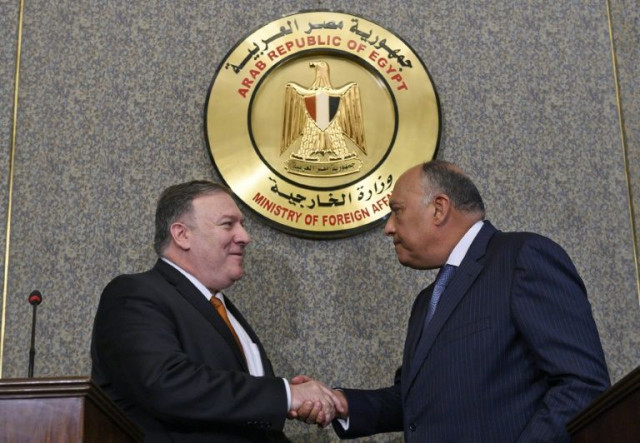Pompeo vows US troops will leave Syria
Turkey and United States are now at loggerheads over future of Syrian Kurdish forces

US Secretary of State Mike Pompeo insisted Thursday that US troops will leave Syria, ahead of a keynote speech aiming to lay out a coherent US policy in the Middle East.
President Donald Trump's "decision to withdraw our troops has been made. We will do that. We will withdraw our forces, our uniformed forces, from Syria and continue America's crushing campaign," Pompeo told reporters.
Washington's top diplomat was speaking at a joint press conference with his Egyptian counterpart Sameh Shukry on the third leg of a key Middle East tour.
He also met earlier with Egyptian President Abdel Fattah al-Sisi, after arriving in Cairo late Wednesday on his longest trip since taking office last year which has already taken him to Jordan, Baghdad and Arbil.
Pompeo launches Mideast tour vowing no Islamic State return
Later Thursday, Pompeo was to give a planned address entitled "A Force for Good: America Reinvigorated in the Middle East" at the American University in Cairo.
His tour is aimed at urging regional allies to continue to confront the "significant threats" posed by Iran and Islamic militants despite Trump's shock decision last month to pull all 2,000 American troops from Syria.
But the muddled pronouncements from the Trump administration, which swiftly walked back the planned withdrawal of troops from Syria, has triggered regional concern.
A senior State Department official insisted ahead of the trip the US will "not leave the Middle East."
The whistle-stop tour will also take Pompeo to Gulf countries including the United Arab Emirates, Bahrain, Qatar and Saudi Arabia.
As he arrived in Egypt, the State Department described the country as a "steadfast partner in the anti-terror fight, and a courageous voice in denouncing the radical Islamist ideology that fuels it".
But there are rising concerns that US policy is getting bogged down. A long-promised proposed Trump plan for a peace deal between Israelis and Palestinians has so far failed to materialise.
And many of the Trump administration's decisions have stoked confusion and angered many regional allies.
US to keep aiding Saudis in Yemen despite furor: Pompeo
"By most accounts, Trump's Middle East policy has made a messy Middle East even messier," said Aaron David Miller on Twitter, a former US diplomat and now an analyst at Woodrow Wilson Center.
"A risk averse president who makes new policy by tweet or phone call surrounded by risk-ready advisers who run cleanup, don't respect deliberation and have objectives that aren't clear or attainable equals US policy (or lack of it) in Syria."
Turkey and the United States are now at loggerheads over the future of Syrian Kurdish forces, considered by Ankara as "terrorists", after the troop pullout.
Turkish officials had a tense meeting this week with Trump's national security adviser John Bolton in Ankara aimed at coordinating the pullout process after Bolton set conditions that appeared to postpone it indefinitely.
The terms included total defeat of ISIS - still active in some Syrian regions - and ensuring that Kurdish fighters who fought alongside the Americans against the militants will be protected.
On Thursday, Turkey renewed its threat to launch an offensive against Kurds.
"If the (pullout) is put off with ridiculous excuses like Turks are massacring Kurds, which do not reflect the reality, we will implement this decision," Turkish Foreign Minister Mevlut Cavusoglu told NTV television.
Ahead of his visit to Saudi Arabia in the coming days, Pompeo is also expected to confirm the strength of the US alliance with Saudi Arabia, despite the murder of Saudi journalist Jamal Khashoggi whose murder was blamed on the powerful Saudi Crown Prince Mohamed bin Salman by the US Senate.



















COMMENTS
Comments are moderated and generally will be posted if they are on-topic and not abusive.
For more information, please see our Comments FAQ